2024 Elections
School Board Elections 2024: What’s at Stake
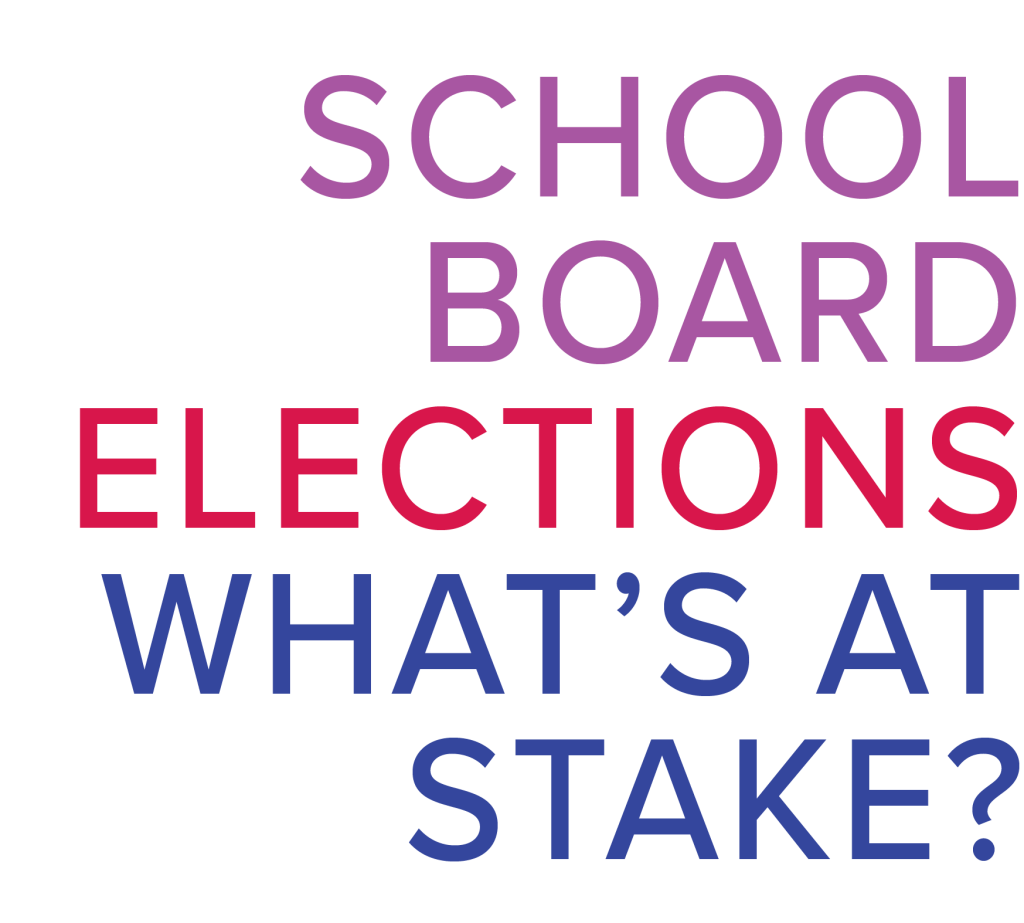
BOARDS OF EDUCATION MAKE DECISIONS THAT AFFECT OUR DAILY LIVES AND CAREERS—FROM CONTRACTS TO COMBATTING BOOK BANS, BOARDS OF EDUCATION ARE WHERE THE ACTION IS. THAT’S WHY SOME EXTREMIST
GROUPS ARE SO INTERESTED IN SPENDING BIG MONEY IN LOCAL RACES AND PURPOSELY DRAWING VOTERS INTO NATIONAL, POLITICIZED CULTURE WARS.
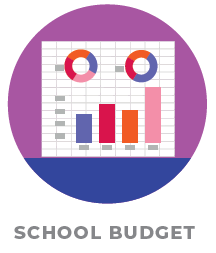
YOUR BOARD OF EDUCATION IS RESPONSIBLE FOR …
Look for these icons throughout this story. They illustrate the items in your contract that are decided by your local board of education. YOUR VOICE MATTERS! Find out when your next contract negotiations take place and learn how you can help your union win on issues that matter to public education.
You’ve read the news: shadowy, extremist groups with little to no experience or training in education theory or practice are challenging previously embraced K-12 literature and curriculum. From manufacturing crises by claiming students are being taught things which they aren’t, to using racist and anti-LGBTQIA+ dog-whistling and banning beloved books, local school boards—and school board elections—are becoming some of the most visible and contested battlegrounds in the culture wars simmering across the country.
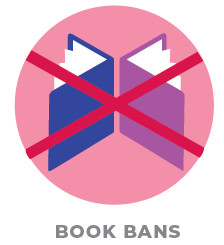
The often fringe, reactionary, and billionaire-funded groups pushing these agendas are seeking to stoke division and distrust of public schools while taking instructional decisions out of the hands of educators and books out of media centers. The stakes for school board races are becoming higher—their impact goes beyond what your next contract looks like and extends into parts of our schools and profession that have always been seen as the purview of educators rather than political extremists.
This confrontational agenda, ignited by far-right political extremists, has and is continuing to spread dangerously throughout the country. Even here in Maryland, educators have witnessed that agenda in school board races and in efforts to ban books, question our true history, and muzzle educators from western Maryland to the Eastern Shore.
There are 58 board of education seats up for election in 20 of Maryland’s 24 jurisdictions. Seven of those counties have a majority of seats on the ballot. In many counties there’s a very real—and persistent—threat posed by extremist candidates and their potential to disrupt and damage years of work to build supportive and inclusive school communities.
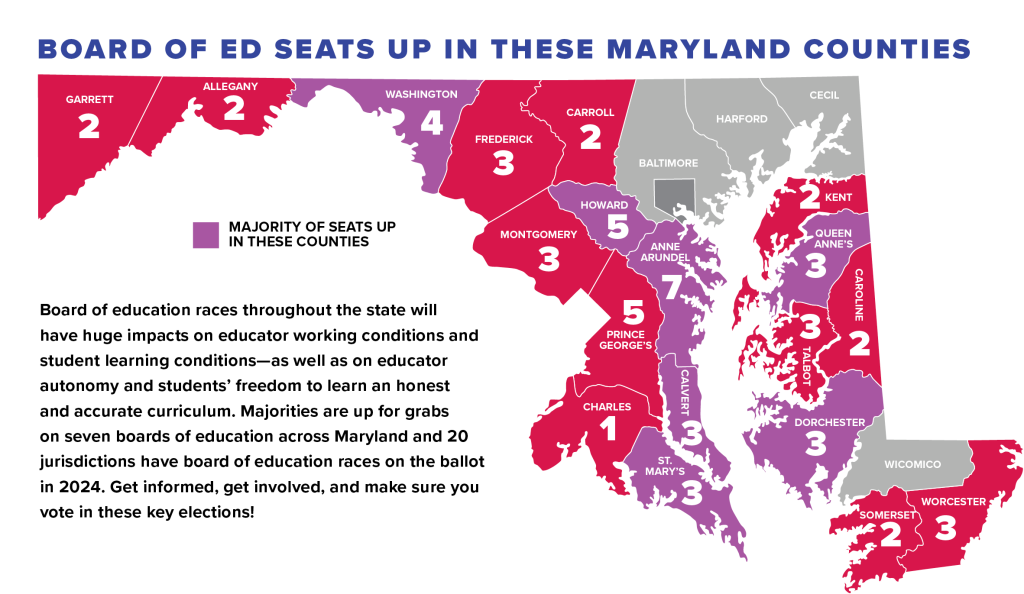
Last year, many school board elections in Maryland featured extremist candidates parroting cookie-cutter, far-right talking points and issues pitted against more moderate and traditional candidates.
Frederick County’s Education Not Indoctrination slate promised that local schools “would cease to be a training ground for political activists who hate America.” Nevertheless, in Frederick County, the teachers, support staff , and administrators unions scored a big win by campaigning hard to elect their backed slate of four pro-public education candidates, three of whom were elected, including a retired teacher. “We focused on organizing and turning out the vote for candidates who value welcoming schools for every child and who believe all children deserve a fair and honest education,” said Frederick County Teachers Association President Missy Dirks.
“Through our endorsement process we found and supported candidates who had varied and valuable experience working with students and our community. We concentrated on spreading the word about them and their extremely positive contributions,” Dirks added.

Baltimore County saw trouble coming last year as well with several extreme candidates, one of whom said schools “have to get back to teaching love of God and country” and that the only flag that should be permitted in schools is the American flag. In that race, three extremist candidates squared off against the educator-recommended Apple Ballot candidates.
“Staring at the possibility of a potential bloc of regressive board members, members in Baltimore County doubled-down on our political organizing,” said Teachers Association of Baltimore County President Cindy Sexton. “Our approach sought to counter the toxic culture wars of national politics that these candidates brought so we refocused our attention directly on the members and voters of our community.
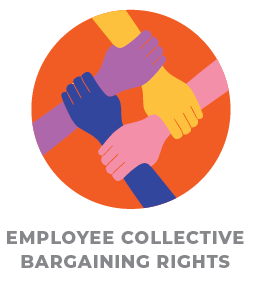
“TABCO members, as members and protectors of all children, wrote thousands of letters to voters in the areas near their own schools to urge them to vote for board candidates who support the same protective and inclusive values as us,” Sexton added.“ The letters were an amazing success. We rejected division and bigotry and Baltimore County did, too.”
Nearby, the Harford County Education Association (HCEA) recommended three winning candidates in five highly contested races with extreme candidates in 2022. Like FCTA’s Dirks, President Chrystie Crawford-Smick said members ramped up their activism to stand up to the threats and build for the future. “We’re committed to flipping the script. Despite the negativity our members hear during public comment at board of ed meetings, they have decided to fight back by sharing their stories and focusing on the work. Our members are more involved and invested than ever before and our membership continues to grow.”


“Right now we’re seeking pro-public education candidates to run in 2024 and we’re working with our state delegates to revamp the make-up of our board of education, which now includes six elected members and three appointed by the county executive.”
Book Bans
Banning books is the latest push from extreme groups in a coordinated top-down eff ort that is playing itself out in school and local libraries across the country. According to PEN America, an advocacy group for free expression through the advancement of literature and human rights, 3,362 books were banned in the last year, a record high. “Of the record 2,571 unique titles targeted for censorship, most were by or about LGBTQIA+ persons and Black, Indigenous, and people of color,” the American Library Association (ALA) says on its website.
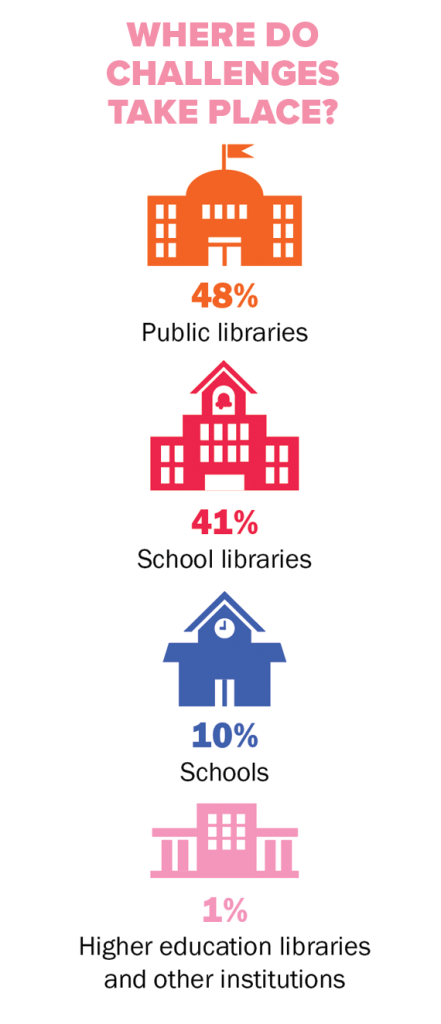
“This is a dangerous time for readers and the public servants who provide access to reading materials. Readers, particularly students, are losing access to critical information, and librarians and teachers are under attack for doing their jobs,” said Deborah Caldwell-Stone, director of the ALA’s Office for Intellectual Freedom.
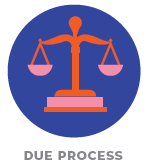
In Carroll County, two extremist candidates, both backed by the county’s Moms for Liberty chapter, have already filed for their candidacy for 2024 Board of Education races. Moms for Liberty is behind the request to ban at least 58 books from county schools—books that the superintendent has already taken off the shelves pending scrutiny through the lens of a new materials approval policy. According to the Baltimore Banner, Moms for Liberty said their objections weren’t based on gender or race, yet several of the challenged books were authored by LGBTQIA+ writers or writers of color.

Celeste Jordan, president of the Carroll County Education Association, said CCEA is disappointed that the superintendent chose not to follow the established procedure on requests for reconsideration of books in the media centers’ collection. “There was an established procedure and CCEA does not believe the books should have been pulled from the shelves simply because of a larger number of challenges. CCEA believes the process should have been followed and requests should be processed in the order received,” Jordan said. “The key is that books must be read and judged as a whole, not by a page or a chapter. Our media specialists are trained professionals. Let us do the job we were hired to do—educate.”
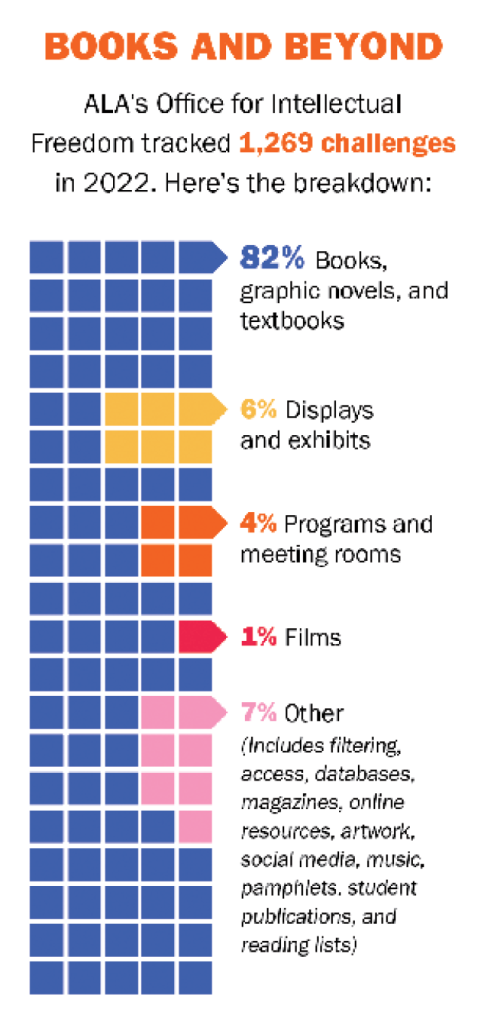
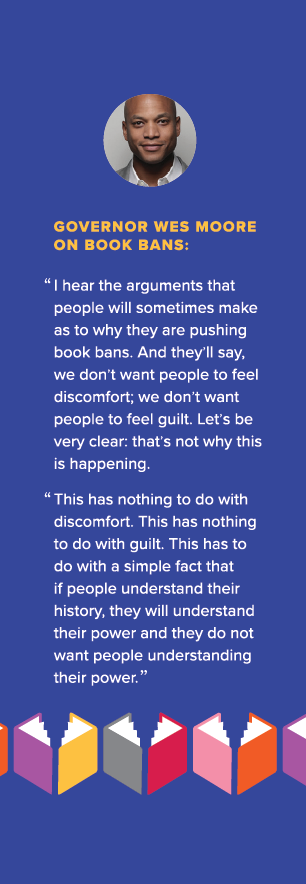
“We’re educating our members on what we can do to fight anti-educator, anti-LGBTQIA+, and censoring policies coming from board members seeking to limit our children’s education,” said HCEA’s Crawford- Smick. “The constant anti-LGBTQIA+ and anti-educator comments from a very small minority of the community stoke fear in our students. “Our members are invested in providing an education that is honest and respects all students and backgrounds and allows students access to books with characters and storylines similar to their own lives or backgrounds,” Crawford-Smick added. “It doesn’t matter if our members are Republican or Democrat—we all want to support our students’ freedom to learn.”
It’s Time to Plan
There are 58 board of education seats up for election in 20 of Maryland’s 24 jurisdictions (see map at the top of the story). Seven of those counties have a majority of seats on the ballot. In many counties there’s a very real—and persistent—threat posed by extremist candidates and their potential to disrupt and damage years of work to build supportive and inclusive school communities. Those threats require long-term and strategic organizing and engagement to make sure union members and community members understand the stakes. Simply mobilizing right before election day isn’t enough.
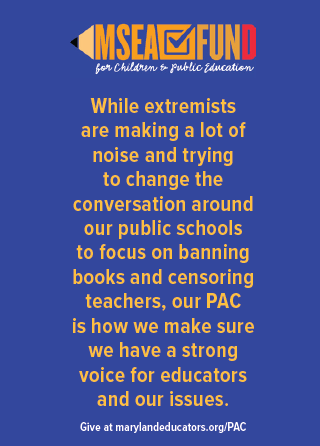
“Right now, our joint government relations committee, which includes all three local educator unions—teachers, support staff , and administrators—is working on the endorsement process and organizing plans for the primary election on May 14,” said FCTA’s Dirks.
“The frightening prospect of these extreme ideologies seeping into our beloved schools has members more engaged in tracking the board of education meetings and showing up to speak in support of welcoming schools for all of our students. This fall, we had the best PAC drive we’ve had in a very long time which I know is directly tied to the upcoming board of education election.
“Electing competent, informed, inclusive, and experienced boards of education is absolutely essential to protecting an honest and fair education for all students and our rights as educators,” said MSEA President Cheryl Bost. “It is our responsibility to take action now to protect public education—the hallmark of a free and democratic society.”

